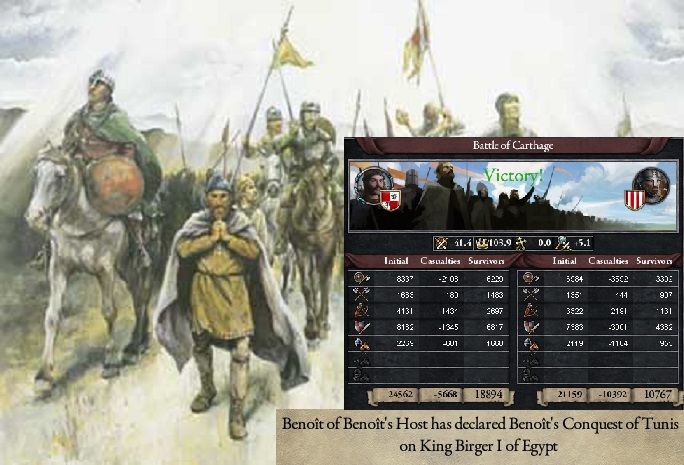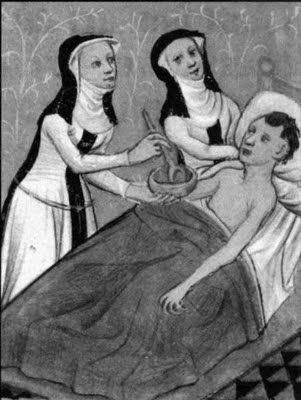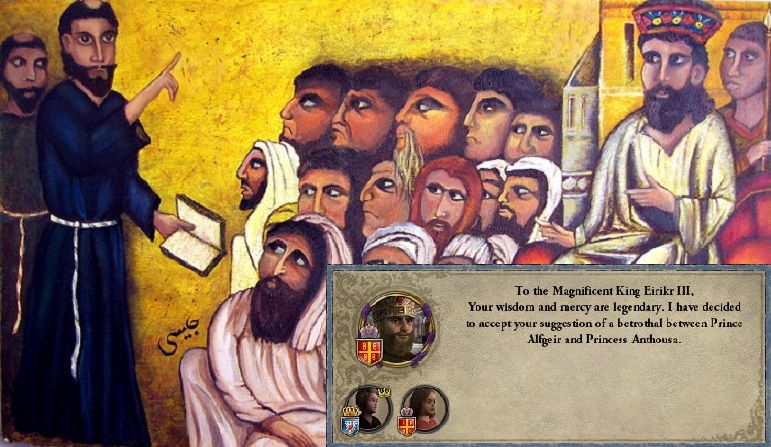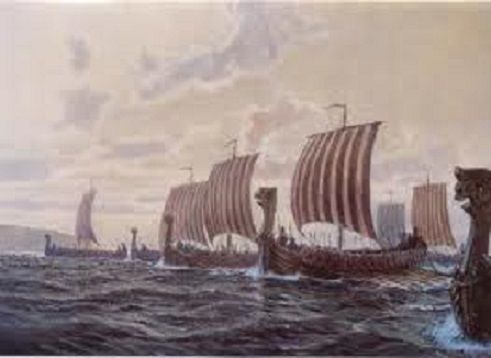
The Serpents of the Nile - The Tales of the Egypto-Norse
- Thread starter Tommy4ever
- Start date
-
We have updated our Community Code of Conduct. Please read through the new rules for the forum that are an integral part of Paradox Interactive’s User Agreement.
You are using an out of date browser. It may not display this or other websites correctly.
You should upgrade or use an alternative browser.
You should upgrade or use an alternative browser.
Feh, I say, feh!
Shame on you for converting to the Nameless God. May your branch wither, your roots be gnawed at by worms, and may the tree of your house get struck by righteous lightning form the Thunderer!
Shame on you for converting to the Nameless God. May your branch wither, your roots be gnawed at by worms, and may the tree of your house get struck by righteous lightning form the Thunderer!
- 1
Uh...he isn't Nameless. Yahweh or Jehovah.Feh, I say, feh!
Shame on you for converting to the Nameless God. May your branch wither, your roots be gnawed at by worms, and may the tree of your house get struck by righteous lightning form the Thunderer!
Woops, forgot to comment on previous updates. It seems that this marks the ascent to being the greatest power on Earth for the Egypto-Norse, defeating the Abbasids.
Lovely drawings by the way.
Lovely drawings by the way.
Afraid no update today, will get back to writing from tomorrow  .
.
What praise !
!
Haha, I assume you will be supporting the Traditionalist faction and underground Pagans within Egypt?
Indeed!
The aim is to establish ourselves amongst the big boys of the Med, that will not be easy to do, but its accomplishable.
You'll be pleased to know that there will be another drawing featured in the update tomorrow .
.
A Coptic Egyptian Viking Kingdom.
This is the best AAR ever.
What praise
Feh, I say, feh!
Shame on you for converting to the Nameless God. May your branch wither, your roots be gnawed at by worms, and may the tree of your house get struck by righteous lightning form the Thunderer!
Haha, I assume you will be supporting the Traditionalist faction and underground Pagans within Egypt?
Uh...he isn't Nameless. Yahweh or Jehovah.
Indeed!
Woops, forgot to comment on previous updates. It seems that this marks the ascent to being the greatest power on Earth for the Egypto-Norse, defeating the Abbasids.
Lovely drawings by the way.
The aim is to establish ourselves amongst the big boys of the Med, that will not be easy to do, but its accomplishable.
You'll be pleased to know that there will be another drawing featured in the update tomorrow
This is amazing. Spread Coptic Christianity to the whole of the Pagan world! So many possibilities.... subbed.
Birger I, the Monk, Eirikrsson af Munsö
Lived: 903-957
King of Egypt, Africa and Nubia: 946-957
Head of House af Munsö: 946-957

Lived: 903-957
King of Egypt, Africa and Nubia: 946-957
Head of House af Munsö: 946-957

Saint Eirikr II’s son, Birger, is far more deseriving of the title ‘the Pious’ that he became known as. Whilst Eirikr’s personal religious piety was at times slightly suspect – he refused to surrender his concubines even after his conversion to Christianity, and lived a luxurious life when in the capital – Birger’s was unquestionable. This was a man who developed a powerful personal connection with the Christian faith and the Egyptian tradition of monasticism – continuing the process of the Christianisation of Egyptian state and society, as well as centralising political power in the country around the Church and Monarchy.
All Christian monasticism, and indeed some Muslim currents such as Sufism, can trace their heritage back to the Christian ‘Desert Fathers’ of Egypt. These were the early Christians who, following the end of open persecution in the Roman Empire in the 4th century, went into the desert to embrace a form of living martyrdom involving harsh ascetism, and intense spirituality. The Coptic monasteries fascinated Birger from a relatively early age – growing up during a time of religious upheaval in Egypt as his father attempted to transform the country into a Christian nation and made an enemy in the Abbasid Caliphate, Birger was attracted to separation of the monasteries from the secular world, their rejection of luxury and easy living (something which appealed to many Norse, uncomfortable with the drift away from hyper-masculinity in Egypt) and the spirituality of the monks.
Birger’s affinity to Christian spiritualism and his refusal to become directly involved in warfare rankled with the Norse nobility. Indeed, there were strong rumours (recording in the ‘Secret History of the Egyptian Nation’ – a text written by an unknown traditionalist at court) that Birger was a practising and submissive homosexual – an accusation so serious in Norse culture that the accused actually had the right to challenge the accuser to a duel in order to protect his honour. Whether it was Birger’s spiritual belief in ascetic values, or a preference for the other sex that left him distanced from his wife and the company of woman as a whole (although he did sire one son, Birger spent most of his marriage far from his wife) cannot be fully known one way or the other. What is clear is that opinion of the King was split between the Traditionalist Norse who saw him as weak and effeminate – more concerned with the Coptic Church than his own people, and the Egyptians who regarded him as a good and pious King.
The one major military threat to Egypt faced during Birger’s reign was the invasion of Tunis by Benoit Bosonid and an army of 25,000 Provencals. Benoit was the disinherited second son of the wealthy Duke of Provence, with the back of his father Benoit mustered a large army of adventurers, the land hungry and mercenaries and invaded Egypt’s Western Provinces in early 951. The Egypto-Norse were forced to withdraw in the face of overwhelming force and began to regroup an army to eject the Latins. During that time Benoit stormed the defences of Tunis – capturing Egypt’s second city. In 952 Birger’s Marshals were able to muster an army large enough to face Benoit – crushing his army near the ancient site of Carthage, just a few miles from the fallen city of Tunis. Following the Battle of Carthage the Latins withdrew into Tunis itself, before surrendering in exchange for safe passage before the end of the year. It was a potential disaster only narrowly avoided.
Although, clearly, strongly influenced by the ‘regular Church’ that remained separate from the secular world, Birger was also a strong believer in the ‘secular Church’ and proponent of the Papacy in Alexandria. He therefore sought to bring greater unity between Church and state – increasing the power of both. In 948 the capital was moved from Aswan (where it had resided since 880), to Alexandria – the country’s ecclesiastical centre and seat of the Papacy. Moreover, the move to Alexandria allowed for more efficient communication throughout the Kingdom – with a port capital the important African provinces were now more in reach, whilst the Nile would allow for a continuation of the strong links within Egypt itself.
Birger also continued to process of limiting the power of the nobility – their defeat to his father in the 920s had truly broken their power as the Egyptian crown grew further in strength through the 940s and 50s. The culmination of Birger’s reforms came in 956 when he changed the succession law from a succession based upon seniority to primogeniture – ensuring that his one son and heir would follow him as King.
The change in the succession law could not have come sooner for Birger’s son as the Monk King passed away, at the age of 53 less than a year later. The King’s son, Eirikr III, was notable for being the first Egypto-Norse King with a noticeably dark complexion. Although his mother’s Berber ethnicity explains the darker pigment, his skin tone only strengthened claims amongst Traditionalists of Birger’s unorthodox sexual preference (and more importantly his lack of masculinity) and the new King’s illegitimacy. The Traditionalist faction would henceforth see the line of af Munsö as wholly corrupted, instead supporting an alteration of the Kingdom’s succession laws to one based upon election by the nobility as a means of unseating the ruling dynasty.
Can you confirm or deny that King Björn Ironsides was responsible for stealing the Sphinx' nose during his invasion?
I'm very curious to see if the Norse culture will be able to survive or if the ruling elite will eventually become naturalized.
EDIT: Update posted while I was typing, woo! I foresee great strife in the future between the good, true Norsemen and these soft womanly kings
I'm very curious to see if the Norse culture will be able to survive or if the ruling elite will eventually become naturalized.
EDIT: Update posted while I was typing, woo! I foresee great strife in the future between the good, true Norsemen and these soft womanly kings
Last edited:
You do understand that there won't be a Renaissance now?
Yeah, I guess Western Europe's chances of transforming into the most vibrant and modern part of the world are not nearly so great in this reality. More likely it will be the core of the two great Islamic powers (the Andalucian and Arab Caliphates), and the two Christians (Egypt and the Byzantines) - perhaps with the Chinese who would lead the world technologically. Makes you wonder about all the other butterflies of this world.
This is amazing. Spread Coptic Christianity to the whole of the Pagan world! So many possibilities.... subbed.
Indeed, the Oriental Orthodox Church must become the greatest on earth!
Can you confirm or deny that King Björn Ironsides was responsible for stealing the Sphinx' nose during his invasion?
I'm very curious to see if the Norse culture will be able to survive or if the ruling elite will eventually become naturalized.
There's every possibility
There is a clear conflict within the Norse elite between those who are moving towards naturalization - with the monarchy now being their standard bearers - and those who want to retain as much of their Norse culture as possible. Its also notable that this last King got an event asking if I wanted to switch cultures to Egyptian, I chose to stay Norse.
Its also notable that this last King got an event asking if I wanted to switch cultures to Egyptian, I chose to stay Norse.
You're probably going to get that event a couple more times, and I think you should always choose Norse. "Norse" in your kingdom basically means Egypto-Norse by now, probably.
First AAR I subbed to, ridiculously well-produced and with an amazing premise. I just hope you're not planning on blobbing ridiculously, so that you will stay Egypto-Norse rather than just another Norse ruler of The world.
Last edited:
Another lovely drawing, as always. I suggest you stick to being Norse, it's the only tie you have left back to your previous homeland.
Anyway, what are your expansion goals going to be? Conquer Africa? Push into Arabia? Maybe take Sicily? Lots of ways to go.
Anyway, what are your expansion goals going to be? Conquer Africa? Push into Arabia? Maybe take Sicily? Lots of ways to go.
Eirikr III Birgersson af Munsö
Lived: 935-961
King of Egypt, Africa and Nubia: 957-961
Head of House af Munsö: 957-961
Lived: 935-961
King of Egypt, Africa and Nubia: 957-961
Head of House af Munsö: 957-961
Eirikr III’s brief reign from 957-961 is usually seen as a mere footnote in Egypto-Norse history as it was a time of remarkable stability, despite great external and internal pressures against the af Munsö monarchy. Had he avoided the illness that left him bedridden in his last days, Eirikr III might have built on the early promise he showed as King and become another legendary figure amongst the pantheon of Egypto-Norse Kings. Alas, fortune did not favour Eirikr III and as he passed away before his 27th birthday.
Undoubtedly Eirikr III’s lasting legacy was the protection of the future of the af Munsö line (with sons Alfgeir and Birger being born in 957 and 959) and the establishment of an official alliance with the Byzantines. The great Christian King Eirikr II, the Pious, had fought alongside the Byzantines in the 940s, but it was not until his grandson’s reign that this alliance was set in stone as the heir to the Egyptian throne, Prince Algeir, was betrothed to the eldest daughter of the Byzantine Emperor. The alliance between the two great Christian realms of the Mediterranean was now set in stone.
Eirikr III was arguably the most talented of a long line of Egyptian Kings who possessed impressive diplomatic skills. Aside from his triumph in negotiation with the Roman Emperor he moved to heal divisions within the political elite at home after the divisive rule of his father. Norse was confirmed as the language of court and of government (although the largely Egyptian bureaucracy continued to work in their native Coptic tongue). Eirikr also eased the fears of the nobility that the Church and Crown would further encroached upon the powers of the nobility and began to distance the monarchy from total obedience to the Church (increasing the level of taxation placed by the crown on Church lands). With these actions Eirikr looked to divide the Traditionalist camp and isolate those emphatically against the af Munsö line.
At the very end of Eirikr III’s reign in 961 Egypt seized the port of Cagliari – on the Southern tip of Sardinia. With the Byzantines dominating the Eastern Mediterranean, this move marked the beginning of Egyptian efforts to dominate the Western Mediterranean – projecting power from Tunis.
Sadly for Eirikr, he would not live to see Egypt’s ambitions in the Western Mediterranean realised. During the winter of 960 his health began to fade rapidly, afflicted by illness he was largely bedridden through most of 961, before he died at the onset of winter that year. His throne passed down to his son – a mere toddler just turned four. With it having been clear for some time that there was a strong possibility of the King’s death the vultures were already swooping around – looking to establish control over the coming regency council which could potentially reshape the Egyptian monarchy.
You're probably going to get that event a couple more times, and I think you should always choose Norse. "Norse" in your kingdom basically means Egypto-Norse by now, probably.
IIRC shortly after where we are now Alexandria switched cultures to Norse - and I think that event is based on the culture of your capital. Regardless, that was the only time I ever got the event (I've played up to 1100). But I agree that Norse now means Egypto-Norse.
First AAR I subbed to, ridiculously well-produced and with an amazing premise. I just hope you're not planning on blobbing ridiculously, so that you will stay Egypto-Norse rather than just another Norse ruler of The world.
Very lofty praise here
Another lovely drawing, as always. I suggest you stick to being Norse, it's the only tie you have left back to your previous homeland.
Anyway, what are your expansion goals going to be? Conquer Africa? Push into Arabia? Maybe take Sicily? Lots of ways to go.
Main aims of expansion are to establish power over the islands of the Western Med and to face down the Arabs.
Trust the Norse to turn Egypt into a naval power. By the way, I wonder what the 'native Coptic language's word for men from the north could be. I feel like they should have a local equivalent of "Norman", instead of the long Egypto-Norse.
Short update yes, but the things set in motion shows great entertainment promises! And at least Eirikr didn't live long enough to see himself become the villain.
Short update yes, but the things set in motion shows great entertainment promises! And at least Eirikr didn't live long enough to see himself become the villain.
I thought I'd end up losing interest once you went Christian, but I was wrong, the plot is still fascinating and the writing still great as ever. Can't wait to read more. 
You could also look to liberate abyssinia, before they become totally converted. plus then you could form an empire, if you were so inclined.
Generally I'm not a fan of story AARs, but something about your writing and the story is entrapping, like reading an alternate history novel.
- 1
Wow, that's one of the earliest deaths I've ever seen in a ruler. If this kid survives childhood and the inevitable rebellions, he'll be one tough ruler.








